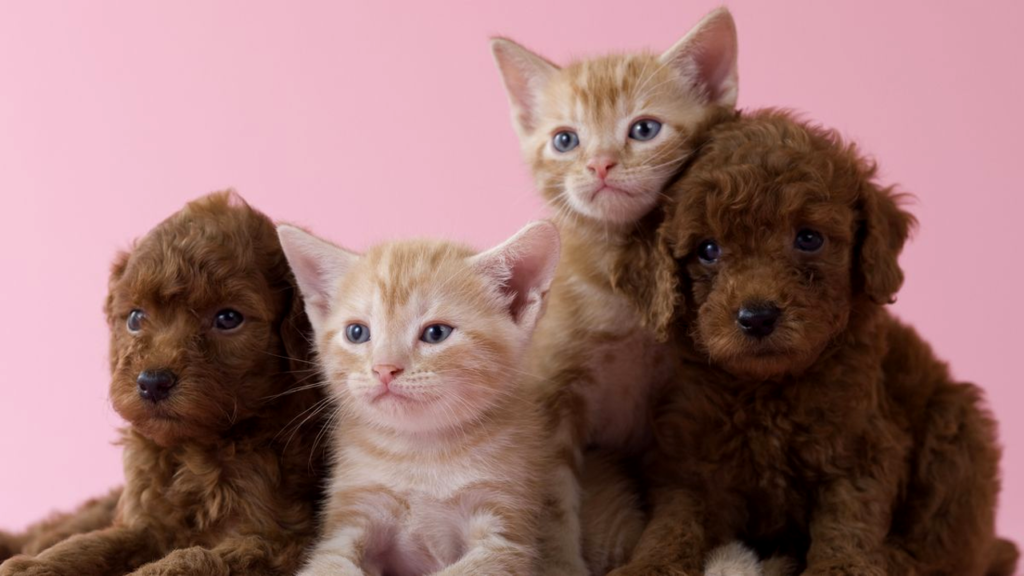
The Science Behind Your Pet’s Personality
Understanding the unique personality of your pet is not only fascinating but also crucial for providing the best care and companionship. Pets, like humans, have distinct temperaments and behaviors that influence their interactions with us and the world around them. In this article, we delve into the science behind what shapes your pet’s personality and how you can nurture it.
Read More: Choosing the Right Pet Trainer: What to Look For
What Influences a Pet’s Personality?

Genetic Factors
Just as genetics play a significant role in determining human personalities, they also contribute to shaping pet behavior. Certain breeds are predisposed to specific traits, such as herding instincts in Border Collies or aloofness in some cat breeds. While genetics lay the foundation, individual variation within breeds exists, emphasizing the complex interplay between genes and the environment.
Early Life Experiences
Early experiences, including socialization during puppyhood or kittenhood, can have a lasting impact on a pet’s personality. Positive interactions and exposure to various stimuli during this critical period can lead to confident, well-adjusted animals. Conversely, a lack of early socialization can result in fearfulness and behavioral issues later in life.
Socialization
Socialization continues throughout a pet’s life and involves exposure to different people, animals, and environments. Proper socialization helps prevent fearfulness and aggression and fosters adaptability. Introducing your pet to new experiences gradually and positively reinforces their confidence in various situations.
Environment
The environment in which a pet lives plays a significant role in shaping its personality. Factors such as living in a bustling city versus a rural area or being raised in a multi-pet household versus a single pet can influence behavior. Providing a stimulating environment with opportunities for exploration and enrichment can promote a happy and well-adjusted pet.
Understanding Dog Personalities
Different Breeds, Different Traits
Dogs exhibit a wide range of personalities, often influenced by their breed’s history and intended purpose. Working breeds may be more energetic and driven, while companion breeds may be more affectionate and relaxed. However, individual variation exists within breeds, highlighting the importance of considering each dog as an individual.
The Role of Genetics in Dog Personalities
Genetic predispositions can influence a dog’s temperament, but individual variation within breeds is common. Factors such as socialization and training also play crucial roles in shaping a dog’s behavior. Understanding your dog’s breed tendencies can help you anticipate their needs and tailor your training approach accordingly.
Socialization and Training Effects
Early socialization and ongoing training are essential for developing a well-rounded dog. Positive interactions with people, other animals, and various environments help dogs learn appropriate behavior and build confidence. Consistent, reward-based training methods can strengthen the bond between you and your dog while reinforcing desired behaviors.
Deciphering Cat Personalities
Independent vs. Social Cats
Cats are known for their independent nature, but individual personalities vary greatly. Some cats are outgoing and affectionate, while others are more reserved and solitary. Respect your cat’s need for space and autonomy while providing opportunities for social interaction and companionship on their terms.
The Impact of Breed on Cat Behavior
While breed can influence certain traits, such as activity level and vocalization, a cat’s personality is also shaped by its environment and early experiences. Whether you have a playful Siamese or a laid-back Maine Coon, understanding your cat’s breed tendencies can help you create an environment that supports their unique needs.
Environmental Factors Shaping Cat Personalities
Factors such as the number of people and pets in the household, access to outdoor spaces, and enrichment opportunities can all impact a cat’s behavior and personality. Providing vertical space for climbing, hiding spots for privacy, and interactive toys for mental stimulation can help keep your cat happy and fulfilled.
The Intricacies of Small Animal Personalities

Rabbits, Guinea Pigs, and Hamsters
Small animals like rabbits, guinea pigs, and hamsters also have unique personalities. While they may not be as extensively studied as dogs and cats, their behavior is influenced by factors such as handling, housing, and socialization. Building a trusting relationship with your small pet through gentle handling and positive reinforcement can help them feel secure and content.
How Environment and Handling Affect Small Animal Behavior
Providing appropriate housing, enrichment, and regular handling can help small animals feel safe and secure, allowing their personalities to flourish. Whether you have a curious rabbit, a sociable guinea pig, or a shy hamster, understanding their individual needs and preferences is key to providing them with a fulfilling life.
The Role of Science in Studying Pet Personalities
Research Methods Used to Study Pet Behavior
Scientists use various methods, including observational studies, behavioral assessments, and genetic analyses, to better understand pet personalities. By studying factors such as genetics, early experiences, and environmental influences, researchers gain insights into the complex interplay of factors that shape pet behavior.
Insights Gained from Scientific Studies
Research on pet personalities has revealed valuable insights into topics such as animal welfare, human-animal interactions, and the effects of environmental enrichment. Understanding these findings can help pet owners make informed decisions about their pet’s care and well-being.
Applications in Improving Pet Welfare and Owner Understanding
Understanding pet personalities can aid in the development of effective training and behavior modification techniques, ultimately enhancing the bond between pets and their owners. By tailoring care to suit individual needs and preferences, pet owners can ensure that their pets lead happy, fulfilling lives.
How to Recognize Your Pet’s Personality
Observational Cues
Pay attention to your pet’s body language, vocalizations, and interactions with you and other animals to gain insight into their personality. Whether your dog wags their tail enthusiastically when greeting you or your cat kneads their paws contentedly while being petted, these subtle cues can reveal a lot about your pet’s temperament and preferences.
Consulting with Professionals
Veterinarians, animal behaviorists, and trainers can provide valuable guidance in understanding and working with your pet’s personality traits. Whether you’re dealing with behavioral issues or simply want to better understand your pet’s needs, seeking professional advice can help you address concerns and strengthen your bond with your pet.
Understanding Common Behavioral Traits in Different Species
Educate yourself about typical behaviors for your pet’s species to better recognize and appreciate their individual quirks and preferences. Whether you have a dog, cat, rabbit, or hamster, understanding the species-specific behaviors can help you provide appropriate care and enrichment for your pet.
Nurturing Your Pet’s Personality

Tailoring Care to Suit Individual Needs
Adapt your care routine to accommodate your pet’s personality, providing activities and experiences that align with their preferences and comfort level. Whether it’s daily walks for an energetic dog or quiet cuddle time for a shy cat, tailoring your interactions to suit your pet’s needs can strengthen your bond and enhance their well-being.
The Importance of Positive Reinforcement
Use positive reinforcement techniques to encourage desirable behaviors and build a trusting relationship with your pet. Whether it’s offering treats for good behavior during training sessions or showering your pet with praise and affection for following commands, positive reinforcement helps reinforce positive behaviors and strengthen your bond with your pet.
Creating an Enriching Environment
Provide plenty of mental and physical stimulation through toys, games, and opportunities for exploration to keep your pet engaged and fulfilled. Whether it’s providing puzzle feeders for a food-motivated dog or setting up a climbing tree for an adventurous cat, enriching your pet’s environment helps prevent boredom and promotes overall well-being.
Read More: Pet-Friendly Hiking Trails: Exploring Nature with Your Pet
FAQs
- Can pets’ personalities change over time? Yes, just like humans, pets’ personalities can evolve over time due to experiences, training, and aging.
- Do mixed-breed pets have unique personalities? Absolutely! Mixed-breed pets often exhibit a combination of traits from their various breeds, making their personalities unique and diverse.
- How can I help my shy pet become more outgoing? Gradual exposure to new people, animals, and environments, along with positive reinforcement for confident behavior, can help shy pets build confidence over time.
- Are there certain activities that can help me bond with my pet? Activities such as training sessions, interactive playtime, and grooming can strengthen the bond between you and your pet by promoting trust and communication.
- Can pet personality affect training success? Yes, understanding your pet’s personality can inform your training approach, making it more effective and enjoyable for both you and your pet.
The Final Words
Understanding the science behind your pet’s personality is essential for fostering a strong bond and providing optimal care. By recognizing the factors that influence behavior and personality, you can tailor your approach to meet your pet’s individual needs and enhance your shared experiences.







